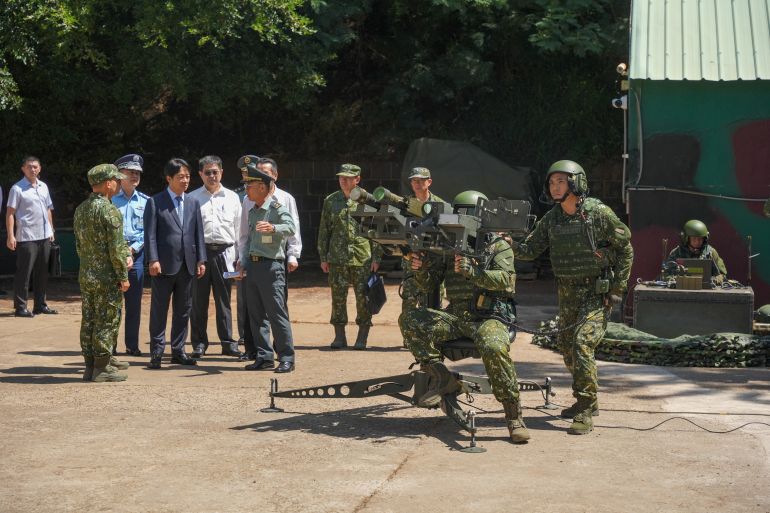China sanctions US defence firms over arms sales to Taiwan
Beijing tells Washington to ‘stop conniving and supporting Taiwan independence’.
Taiwan President Lai Ching-te (4th left) watches a demonstration of a US-made Dual Mount Stinger air-defence system during a visit to inspect military troops on Penghu Islands, on September 6, 2024 [Walid Berrazeg/AFP]Published On 18 Sep 202418 Sep 2024
China has imposed sanctions on nine US defence firms over sales of military equipment to Taiwan.
The Ministry of Foreign Affairs in Beijing announced the measures on Wednesday. The move comes as China continues to raise the pressure on Taiwan and demands that Washington end support for its declarations of independence.
The ministry said China has frozen the property of the nine firms on its territory and is prohibiting all transactions with China-based people or entities with immediate effect, according to a statement.
Spokesman Lin Jian said that US weapon sales to “China’s Taiwan region” had “seriously violated the one-China principle … infringed upon China’s sovereignty and security interests” and “damaged China-US relations”.
Speaking at a news conference, Lin said Beijing was taking “resolute countermeasures” against the companies.
The affected firms are Sierra Nevada Corporation, Stick Rudder Enterprises, Cubic Corporation, S3 Aerospace, TCOM Ltd Partnership, TextOre, Planate Management Group, ACT1 Federal and Exovera.
On Monday, the US State Department had approved the possible sale to Taiwan’s military of spare parts valued at about $228m.
Taiwan’s defence ministry said the sales package, which would help it maintain “combat readiness”, would “become effective” within a month.
“Stop conniving and supporting Taiwan independence, and stop undermining peace and stability in the Taiwan Strait,” Lin demanded of the US.
‘Red line’
China, which views democratically governed Taiwan as its own territory, has ramped up military and political pressure over the past five years to assert its claims, which Taipei strongly rejects.
The United States switched diplomatic recognition from Taipei to Beijing in 1979 but has remained Taiwan’s most important partner and its biggest arms supplier, sparking repeated condemnations from China.
Beijing and Washington have repeatedly butted heads in recent years on a range of other issues related to trade, access to advanced technology and China’s increasingly assertive actions in the disputed South China Sea.
White House aide Jake Sullivan met high-ranking Chinese military official Zhang Youxia last month during the first visit to China by a US national security adviser since 2016.
Zhang warned during that meeting that the status of the self-ruled island was “the first red line that cannot be crossed in China-US relations”, demanding that the United States “halts military collusion with Taiwan”.
